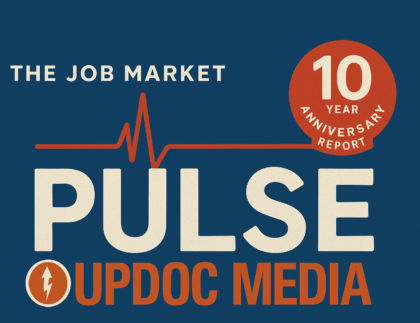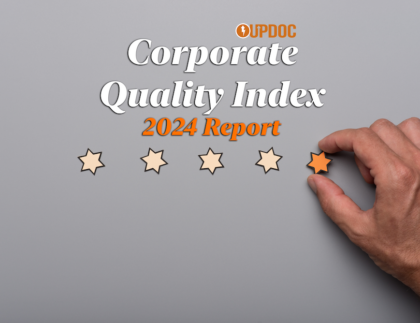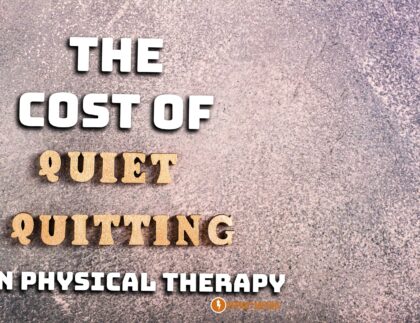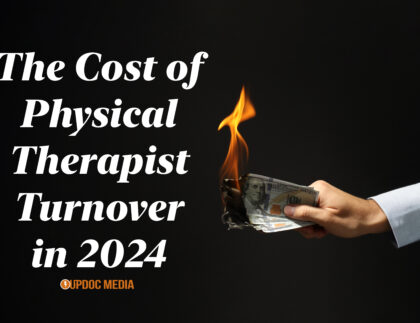
 For this post, we’re bringing you Part 4 out of 5 for the newly graduated physical therapist and the 2015 Physical Therapy Job Market Outlook (please enjoy Part 1, Part 2, and Part 3). Revisiting a popular Facebook conversation on approaching student debt. While this series is dedicated to our hard working #DPTstudent(s), these tips today work for any and all professions for paying your student loans back with a strong financial footing. Today, we’re talking…!
For this post, we’re bringing you Part 4 out of 5 for the newly graduated physical therapist and the 2015 Physical Therapy Job Market Outlook (please enjoy Part 1, Part 2, and Part 3). Revisiting a popular Facebook conversation on approaching student debt. While this series is dedicated to our hard working #DPTstudent(s), these tips today work for any and all professions for paying your student loans back with a strong financial footing. Today, we’re talking…!
5 Tips on Paying Your Student Loans
- Swim against the current. There are lots of jobs in settings and locations that basically for lack of a better word: STINK. Skilled nursing facilities, hospitals in the middle of no where, home health regions which basically feel like you’re driving from one end of the state to the other… these segments of the job market pay frighteningly well. They also aren’t very fun to work in, hence the awesome pay. If you really value the cash and don’t care too much about benefits, explore these options aggressively. You can even do so by signing up with a staffing or travel agency who will send you out to these places and pay you at least 5-10% premium to the top dollar! That means while many new grad PTs may be making $30-35 on average, you could very well be in the $40-45 range.
- Set up a plan. One of my favorite tools in dealing with paying back debt is Power Pay. This free online tool gives you the ability to schedule out your payments against your income. It also does so by rank, so you can choose how you wish to pay things off. Personally, I’ve always advocated first paying off the debt retaining the highest interest rate. In any case, you can choose for yourself how quickly you’d like to pay off your debt. Once you do so, you’ll be able to back track how much money you’d need to make and live off of to meet such a goal. Oh, one really cool thing about this tool: It schedules out your payment scheme to regular monthly budgets. And, finally, the most important aspect of setting up a plan is to make sure you don’t waste money by paying too much interest over time. That, is what a plan is all about.
- Supplement your full time job. In general, per diem and temp assignments pay very well regardless of industry. This is because the employer trying to fill a full time position finds it better to maintain revenue by spending extra money to keep their volume up rather than to simply lose that share entirely. For Physical Therapy, SNFs, home health, travel assignments, and registry work obviously pay the best in the world of PT. However, they aren’t always the most fun places to work. Yet, because they pay so well, consider working 1 or 2 days at one of these settings where 4 hours of work may equate to a full day’s work at your full time job. While you may be sacrificing your Saturday morning, you’re also going to earn an extra day’s worth of wages. So, the trade off isn’t so bad when you’re staring down $100k of loans. And, as a quick blip on this: I can recall a discussion on a PT 2 years out of school who was making more than $200k a year through home health supplementation. Basically, the guy never stopped working and pulled 12+ hour days 6-7 days a week. Worth it? You decide!
- Pay now, save later. While this may be considered an oxymoronic idea, the fact is this: you, as a new grad, have the most value in human capital than at any time in your life. The amount of money you can make and will make is only going to increase as time goes on. Furthermore, saving now may cost you more than paying off your debt earlier. Interest is a deadly thing and one can end up paying several times over the worth of the loan by paying off debt slowly. Specifically to this, I’ve heard of debts being paid off over 20-30 years which causes the interest you pay out to almost eclipse your principle! Why pay double on what you could quickly pay now? Therefore, unless your company offers truly amazing retirement accounts with defined benefits and contributing matching which are through the roof, my advice is to pay off your debt as soon as you can and worry about saving for later when your pay grade is better elevated and suited as such.
- Think about loan forgiveness. Loan forgiveness is really more in the finance/accounting world, specifically to those who hold the credentials of a CPA, CFP, CLU, and/or ChFC — each will mean something different to you depending on where in the planning (or action) process you are. In any case, I’d like to first link the two most helpful resources regarding loan forgiveness I’ve come across so far:
- Office of US Education
- This website is AMAZING. The Q&A sheet is perhaps most helpful.
- Read through this slowly, it’s a bit of jargon but you’ll get through it.
- APTA
- Then go ahead and read this link.
- After reading this one, you’ll quickly realize the following (as I have)…
Basically, one of the most important things other than working for the government is that whichever organization you’re working for is a 501(c)(3) nonprofit organization – otherwise, you just don’t qualify. There are also other independent inclusions such as working for a public health organization but much of that circulates on a case specific basis. Nevertheless, the idea of being done with your loans after 120 payments in 10 years… it is actually quite interesting, exciting, and liberating. Given that the career path is agreeable to you, think about it and think about it early! It’s a lot easier to do this in the first half of your career than later on.
Some parting financial advice:
- Don’t let your debt get your down.
- Since we all have it, we simply need to become better at managing it.
- Be a beast about paying back high interest debts first.
- Don’t skip payments.
- Try not to spend on a whim.
- Stay disciplined to your payment plan and your budget.
- Take advantage of employee benefits.
- Feel free to save a part of your income to invest in short term portfolios.
- Oh, yes! Housing helps a lot when it is tax time.
- Live wisely; within your means and prudently.
However, also be sure you make yourself rich in life; be happy, be joyful, have fun!
So, we hope you enjoyed Part 4 today. Stay tuned for Part 5 on New Grad Career Strategies!





